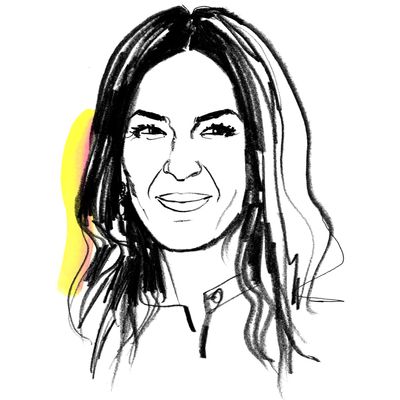
Fashion designer Rebecca Minkoff was in the middle of writing a book about how she built her eponymous brand from the ground up and ran it successfully for 15 years when the pandemic hit, and suddenly she had to go into survival mode. “We had to completely rebuild the company,” she said. “I was like, Oh, wait, we’re starting over right now, as I’m writing about how I started.” Instead of just doling out advice, Minkoff also had to start listening to her own. “Rule 21,” for example, in Fearless: The New Rules for Unlocking Creativity, Courage, and Success, out June 14, is “endless success is being able to keep going.” She’d done it before — she started her brand, which is known for its accessories like the “Morning After Bag,” with no college degree, no money, and no connections — and she could do it again. “It was really cathartic,” she said of the writing process, although not without its challenges. In addition to keeping her business above water, she was also juggling child care and writing the book. Below, the designer shares how she gets it done.
On a typical (pandemic) workday:
I wish I could say that during the pandemic there was a time and a place I worked best, but it was really whenever the kids were away and I had some peace and quiet. Usually I was in my bedroom. Sometimes my bathroom, which has double doors that the kids can’t kick through. Over the summer, I lied to my kids and said that school started early and put them in a summer-school program. Then I was able to write from July into October during the day, peacefully.
Having my kids back in school has been a huge game changer, as I’m sure it’s been for many parents; you can actually work undisturbed for the day. Once you get that time back, you’re like, Oh my gosh, I have so much time, now that I’m not homeschooling! And it’s time for myself. In the morning, there’s about an hour before we start our office hours, when my kids are in school, that I get to exercise — either doing an Isaac Boots workout or going on a walk or a run. But outside of that, there hasn’t been any luxury of time.
The days where I’m done early enough to pick up my kids are my favorite, like around 5 p.m. But that’s rare. Usually, I’m down around 6:30 p.m. and then we all have dinner and hang out. If it’s a busy time, I’ll go back to work. Last night, I was back on from 9:30 p.m. to 11:30 p.m. But I can do it because I know it’s only for a short period of time.
On staying organized:
I’m very type A; everything is scheduled. I’m never like, Oh, I have an hour. What am I going to do with my time? And I’m a big list-maker. That’s how I stay organized. I’m like, Okay, this is immediate, on fire; this can wait; this would be nice to get done. It’s helped me prioritize.
Rather than do a little bit of the book every day, I liked to do four-hour chunks one or two days a week. Toward the end of the process, when the editor had all her notes, sometimes I would just block off a whole day to really dive into it.
On unplugging:
I don’t work on the weekends. Maybe three years ago, I just reached a point where I was like, What’s going to happen if I don’t respond to an email? Nothing. You know what happens? That person will actually also get to relax. So I just decided that I wasn’t curing cancer and that it could wait. My kids need my attention and focus.
Advice for future book writers:
Half the battle is writing, and that has its own unique struggle. But then there’s the birth of it. I’m doing an audiobook and a master class and press [like this]. Going into the process, make sure that you’re fully aware that that part is just as important if you want the book to be successful. I don’t know of an author that just puts out a book quietly and it becomes a best seller. I didn’t know how much work it was going to be — that it was going to take everything I’ve got — but it’s a sacrifice I’m willing to make because I know it’s only temporary. Do I need to be at every marketing meeting right now that’s two hours long once a week? No. Do I need to do a podcast? No. I cannot be a part of things that I’m normally a part of or do because I know there’s an end in sight.
On being fearless at work:
Fear is an emotion that is meant to warn us of danger — to keep you safe from a bear or a late-night stalker — not keep you from going after your career. How do you reframe that emotion? So that when you get that feeling [at work], you’re like, Hold up, hold up. I’m not going to die; I’m just taking a big risk. That’s how I operate. And when you’ve done it enough, taking risks is going to keep things exciting. It sounds crazy now, but when we were talking to our customer back in 2005, it was considered a risk. Our retail partners and editors at magazines were like, “You’re dirtying yourself; you have to be in your ivory tower.” It was scary. We were doing direct-to-consumer before anyone else. And people thought we were crazy when we invited influencers to our shows. During the pandemic, we had to take a ton of risks in terms of how we promoted and how we spoke. Like, why does anyone need a handbag [right now] of all things? But we launched a text-message program. We did cross-promotions and giveaways — things that were stimulating and organic reach for the brand. People were like, Why is an accessible luxury brand doing video ads from the front porch? Well, we didn’t have any other choice, and it was our most successful video. We didn’t even have time to worry.
On her parenting philosophy:
As a parent, there are so many people who are like, “This is the right way to do A, B, and C.” “This is the school they have to go to; this is the block you have to live on.” I’ll never forget when I said to my cousin, “Why do I need to get them into the right kindergarten?” And he was like, “Oh, that’s the track that sets them up for college and the rest of their lives.” I was like, Oh, man, I am going to walk as far away from that viewpoint as possible. People might view that as risky, but I just view it as, Let me give my kids a normal experience when they’re 5 or 3.
On prioritizing:
We have, and have had, incredible wholesale partners, and pre-pandemic, a lot of our time and effort was spent ensuring their success. When we went down to just our own website all of a sudden, it was extraordinarily scary, but it was also an opportunity to look at our own backyard. What we’ve grown in our “garden” is something that we never want to lose sight of. We’re still going to have relationships with our partners, but we’re also going to make sure that internally, we really stand behind everything we do and that our site is a priority. We’re just making sure that we can always eat on what we grow. I like to look for the silver linings in all the destruction, and that’s definitely one of them.


